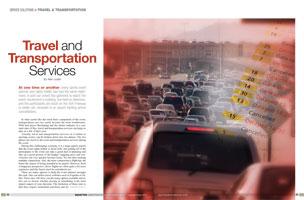
At one time or another, every sports event planner and rights holder has had the same nightmare. A sold out crowd has gathered to watch the event, excitement is building, live feed on television, and the participants are stuck on the 405 Freeway or better yet, stranded in an airport fighting airline cancellations.
In what seems like the most basic component of the event, transportation can very easily become the most troublesome. With fuel prices fluctuating and the airline industry in a constant state of flux, travel and transportation services can begin to take on a life of their own.
Actually, travel and transportation services, as they relates to sporting events, can be broken down into two phases. The two phases are travel to the event and transportation services during the event.
During this challenging economical time, it is a huge jigsaw puzzle that the event rights holder is faced with. Just getting all of the participants to the event can take a good deal of planning and take up a good portion of the budget. Juggling price and convenience can very quickly become tricky. No one likes making multiple connections. Also, the more connections a flight has, the better the chance of being stranded in an airport. However, from a budgetary perspective, direct flights are often quite a bit more expensive and this factor must be considered, too.
 |
| A very important issue to consider is how many buses the company has in its fleet because many transportation companies have small fleets and depend on bringing in buses from other companies. |
There are many options to help the event planner navigate this task. One can utilize travel websites such as Expedia or Orbitz. These sites will show you the many options available and allow you to choose whether pricing or scheduling is the most import aspect of your decision. The limitation of these sites is that they require immediate purchase and do not allow for the holding of tickets awaiting names of the athletes and participants of the event, as well as booking groups of travelers. The advantages of these portals are that if you are able to spend some time doing research, you may be able to save a few dollars by catching one of the internet specials that they run from time to time.
The next option is to go to an airline directly. The advantage to this method is that you are able to hold group space and can actually negotiate your own deal with them. The disadvantage is that one airline will not tell you that you can fly cheaper on another airline. You will have to call multiple airlines directly and discuss pricing, routing, etc., to be able to make the most informed decision.
The final option is to go to a travel management company. The advantage is the company will do the research for you and free up your time to do other tasks related to the event. Also, if the company has a good relationship with the airlines and has status, they can negotiate a good deal on your behalf for group tickets that include more time to provide names, free name changes, free tickets, etc. The disadvantage is that the travel management company will charge a service fee on top of the airline ticket cost for the service. The event planner or rights holder can evaluate the pros and cons of each.
Something that many sporting event planners do to help offset cost is arrange for an event and conventions contract with a major airline that flies into the market of the event. This contract allows for a percentage off of the fare and can be utilized by anyone flying into the event destination city. Normally, this discount ranges from 5 to 10 percent, depending how far in advance the ticket is booked. In addition, the event rights holder earns free tickets for the amount of these tickets that are booked. The normal amount is one free ticket for every 30 tickets booked. These free tickets can be utilized to help defray some of the travel costs associated with the event.
 |
| VIP transportation to the venue is something that should also be considered. |
The next leg of the logistics chain is getting the participants that you are responsible for from the airport to their hotel and subsequently from the hotel to the venue.
As trivial as it may seem, airport transportation can be a very important aspect of the event. For many, this is the first impression of the organization that is hosting the event. A good example is an event that has international participants. For many, this could be their first time travelling to the country and navigating through customs in our major airports can be very intimidating. However, to have a friendly face to meet them outside of customs and then have transportation waiting for them to transport them to the hotel can be very reassuring. Normally, volunteers from the local Convention & Visitors Bureau will be the greeters. Also, certain housing companies will provide greeters if they are handling your housing block.
The final piece of the transportation and travel puzzle is the venue transportation. The ideal situation exists when the hotel is within walking distance of the venue. But sometimes this is not possible.
The first step is the selection of the transportation company which will be providing the transportation. A trip to the bus yard to inspect the buses would be well worth your time. Also, the transportation company should be willing to provide maintenance records and record of incidents upon request. Also, a very important issue to consider is how many buses the company has in its fleet. Many transportation companies have a small fleet and then depend on bringing in buses from other companies if the need arises. However, in this instance, you are depending upon the company to ensure that the buses they bring in meet all standards. A good practice is to utilize a transportation company that has a large fleet and does not have to depend upon external resources.
As with group airline tickets, transportation companies are willing to negotiate, especially if they know you are in the bidding process. Things to negotiate are lower per hour rates, lower minimum times, and lower overage rates.
Once the transportation company has been chosen, it is time to formulate the actual plan. It is good to include the transportation company in the planning process as they are very familiar with routes, construction areas, etc. Many times, the shortest distance is not always the best route as other factors can come into play. In one instance, our event let out the exact same time as a Major League Baseball game. We had to change our route to avoid gridlock.
Another thing to consider is who will actually be transported. If there is media involved, it is important to remember that they will normally be the last ones to leave a venue in order to meet deadlines for their stories, etc. It is not a good thing to remember that the media corps is stuck at the venue with no means of transport to their hotel. If possible, it works best to have a separate transportation plan exclusively for the media corp. Also, VIP transport with exclusive access to the venue is something that should be considered.
During the actual operation of the transportation plan, communication is the key. Having all parties involved (drivers, coordinators, etc.) in direct contact with each other is essential. This will allow decisions and adjustments to be made expeditiously.
Planning and executing a transportation plan does not have to be a daunting task. However,the key will always be flexibility.

